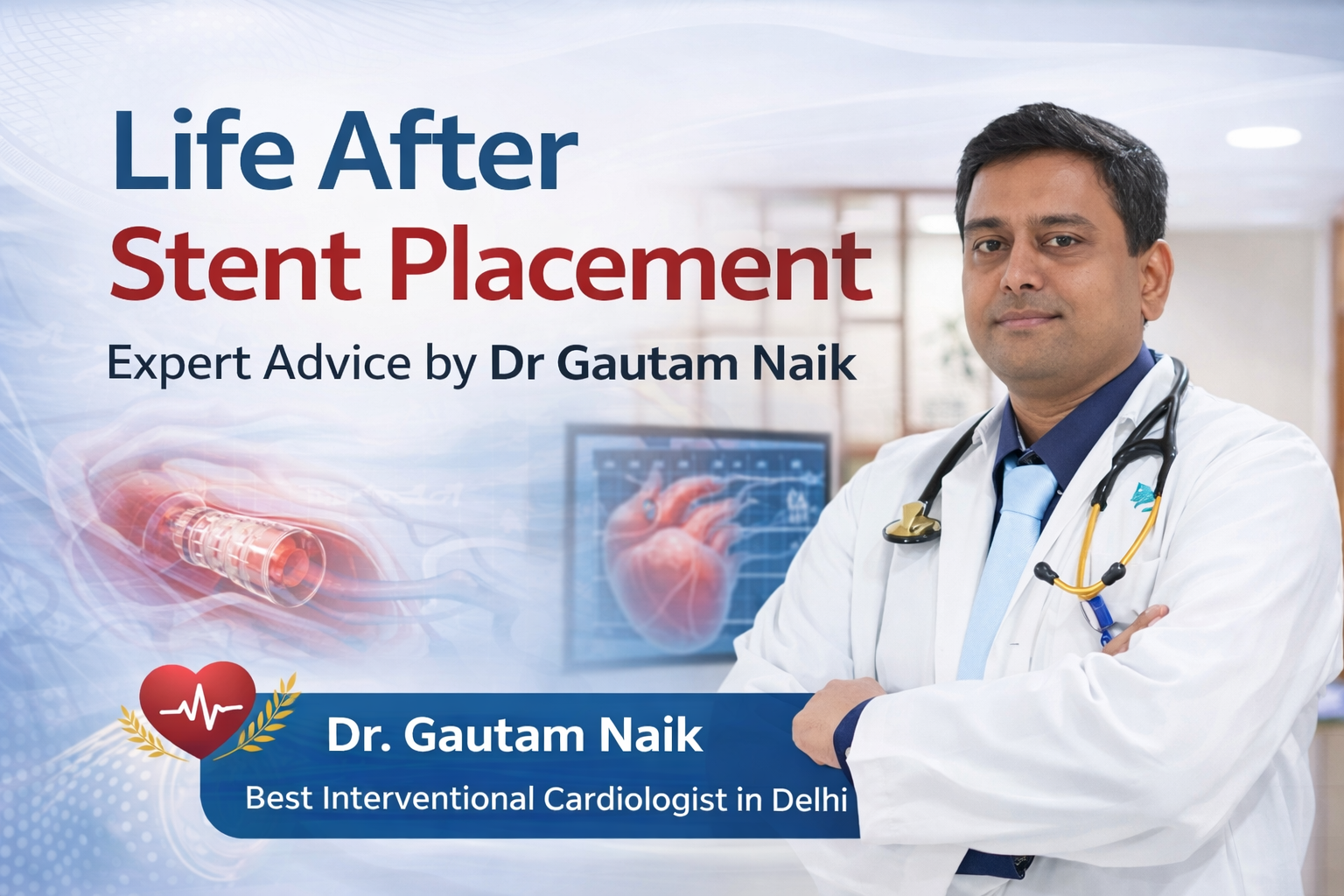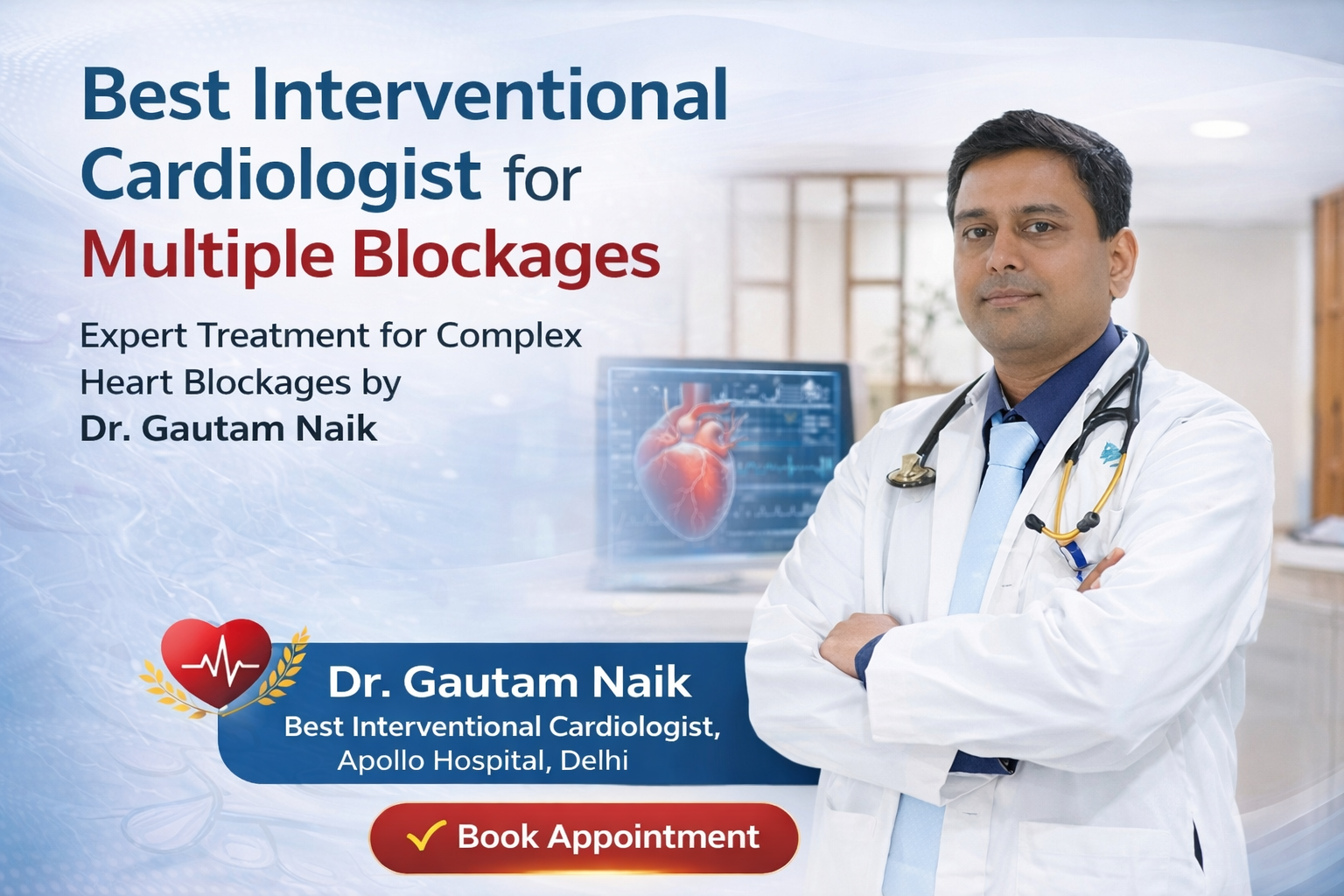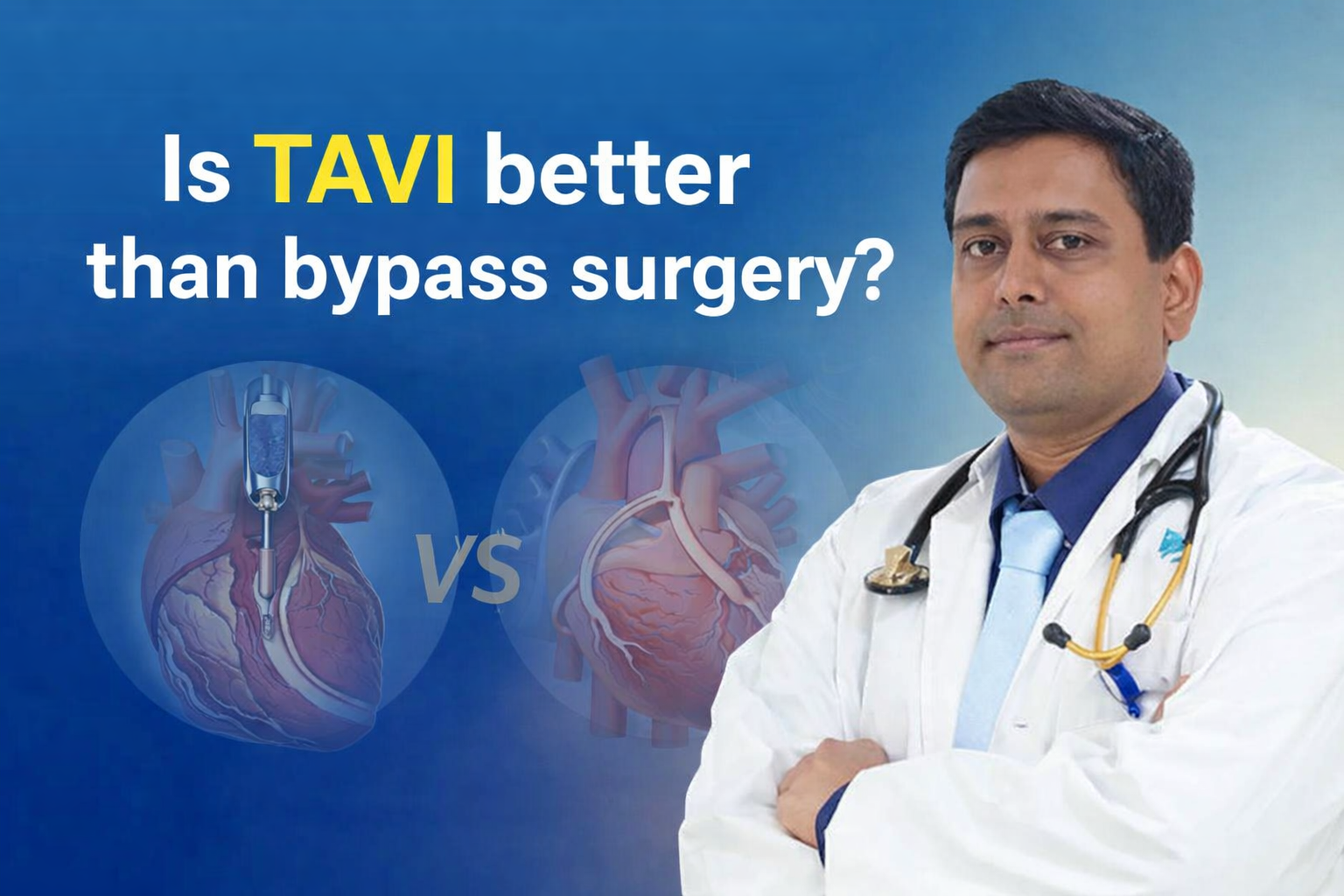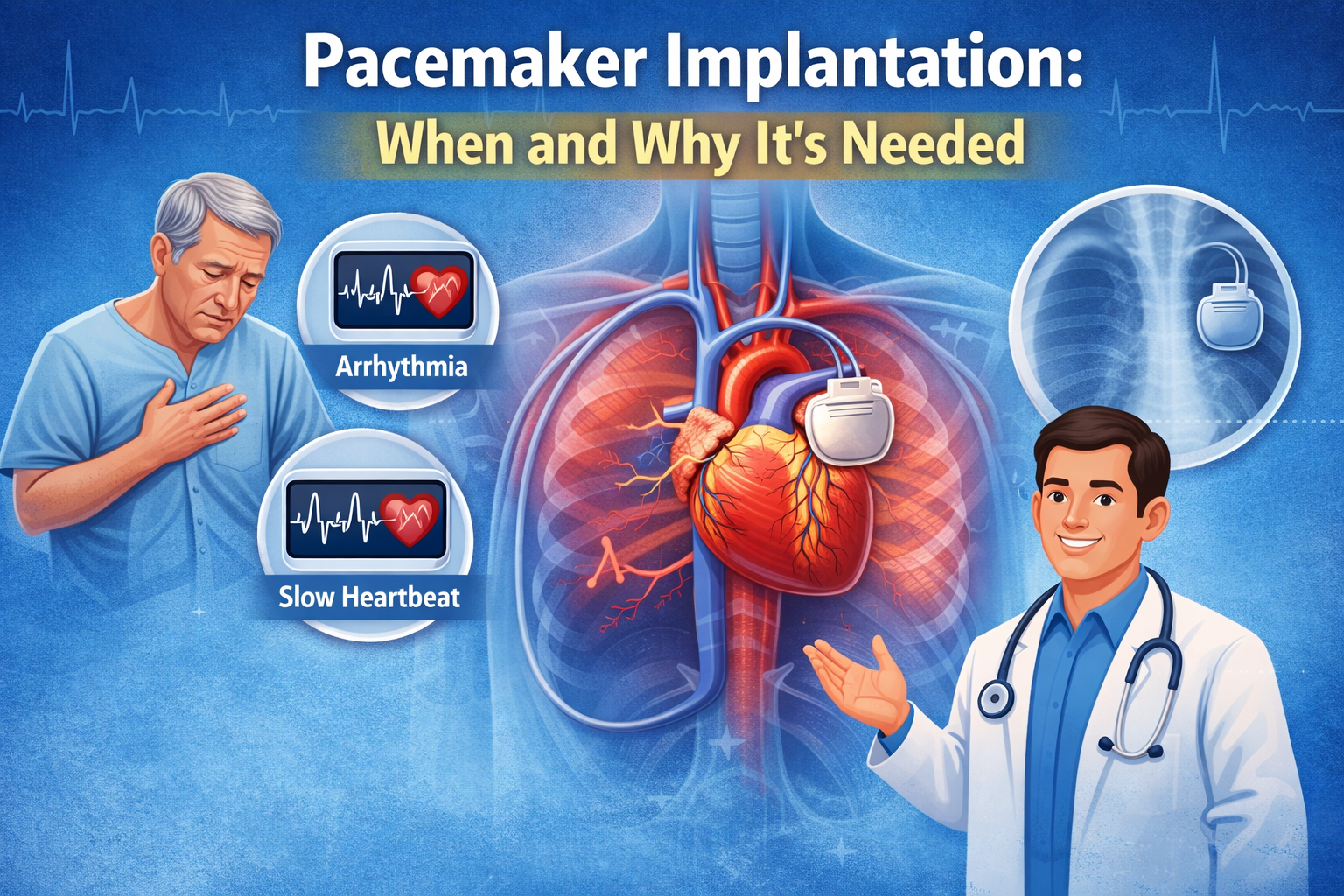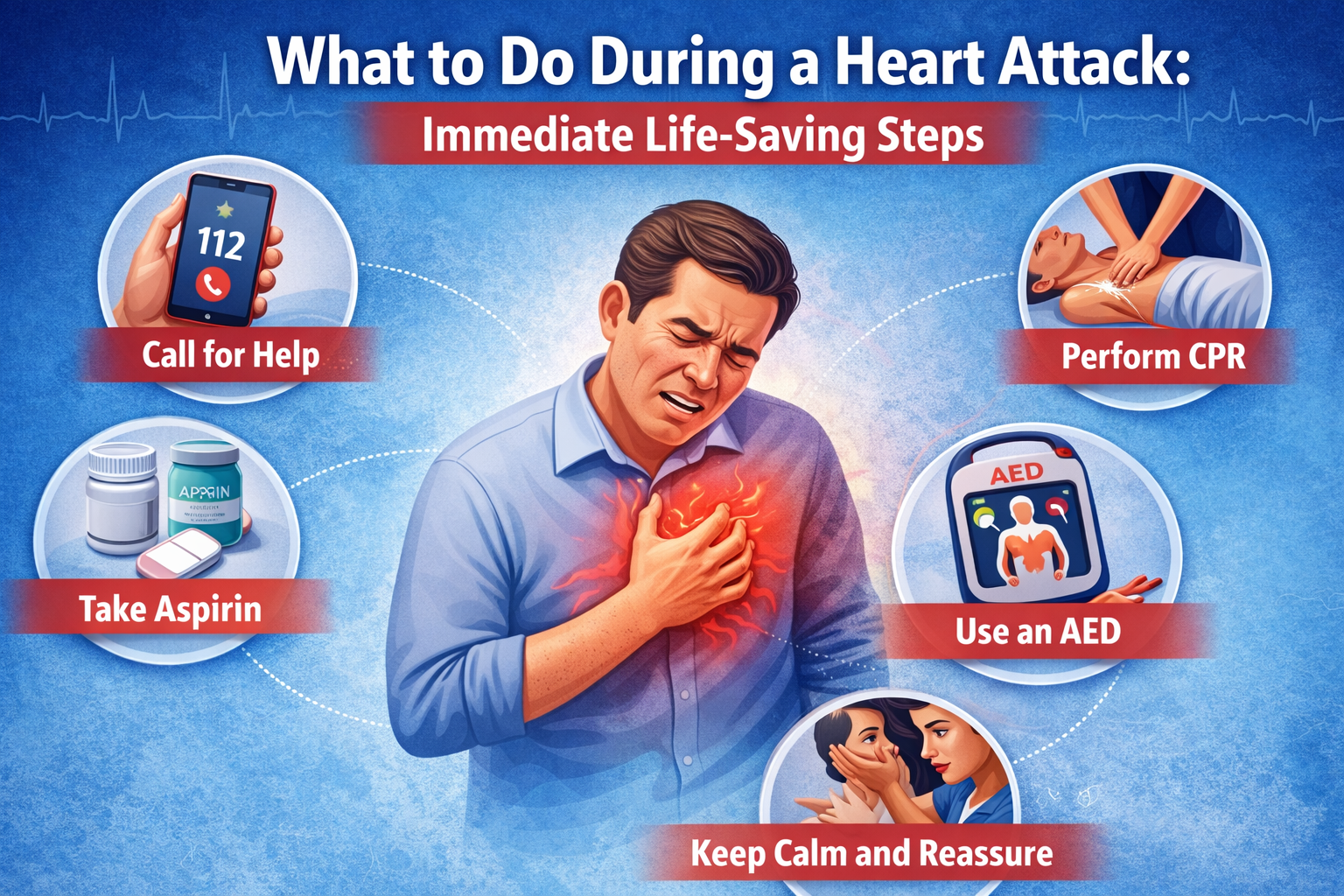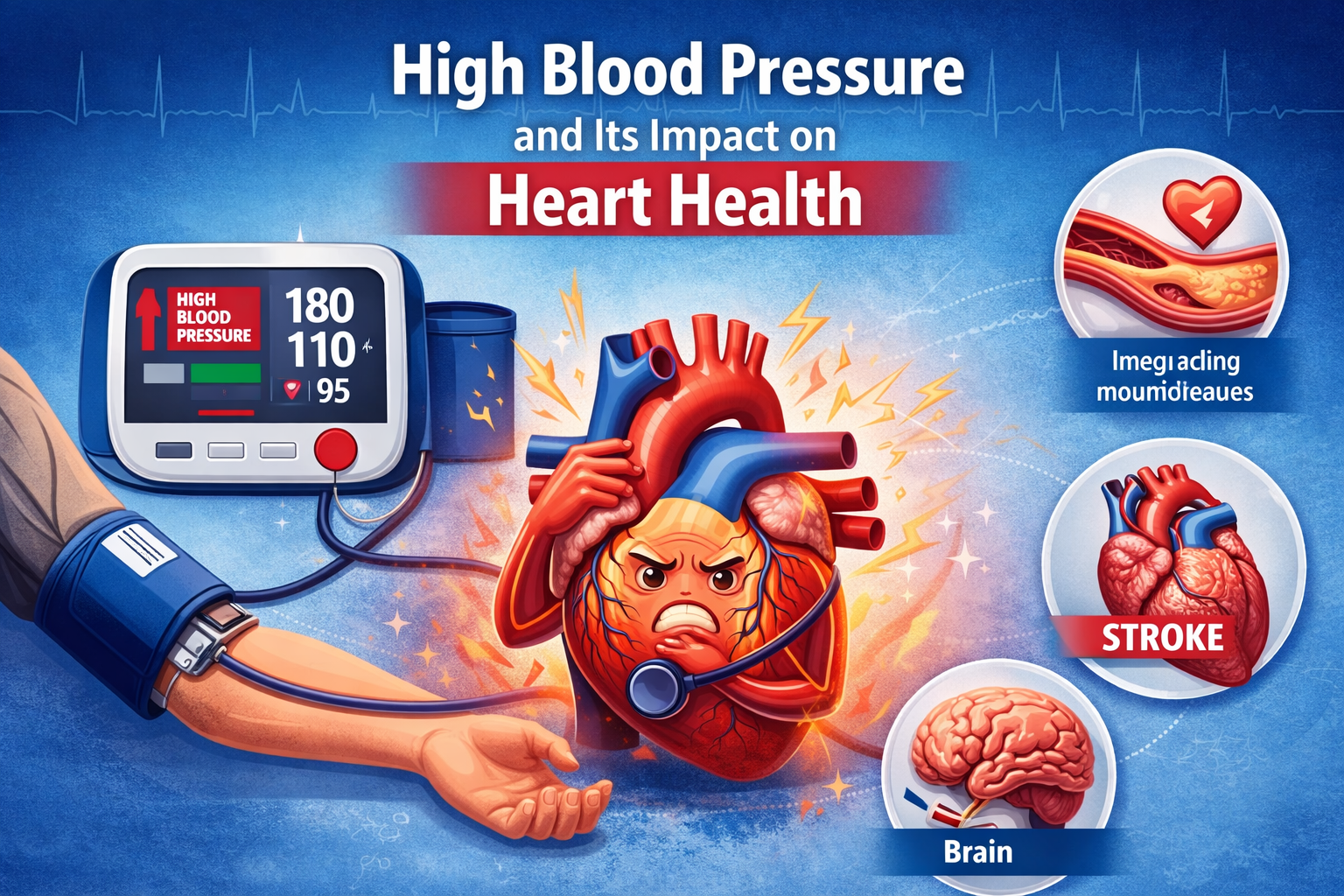
In today’s fast-paced world, heart health has become more important than ever. With changing lifestyles, poor dietary habits, lack of physical activity, and rising stress levels, cardiovascular diseases are on the rise—especially in urban areas like Faridabad. India is witnessing a concerning increase in heart disease cases, and Faridabad is no exception.
This makes early detection and timely care from the best cardiologist in Faridabad not just important but potentially life-saving. Cardiovascular care should never be delayed, especially when the signs—like chest discomfort, breathlessness, or palpitations—start to show.
If you’re searching for a trusted, experienced, and compassionate heart specialist, look no further than Dr. Gautam Naik, widely regarded as the best cardiologist in Faridabad, known for his expert diagnosis, precise treatment, and patient-first approach.
Dr. Gautam Naik stands out as the best cardiologist in Faridabad for several reasons. With over 20 years of experience in the field of cardiology, Dr. Naik combines clinical excellence with modern, evidence-based practices to offer the most reliable cardiac care in the region.
His empathetic approach, accurate diagnoses, and cutting-edge treatments have earned him the trust of countless patients, making him the best cardiologist in Faridabad today.
Heart disease presents itself in various forms. The best cardiologist in Faridabad, Dr. Gautam Naik, provides treatment for a broad spectrum of heart-related conditions, including:
A heart attack, medically known as myocardial infarction, occurs when the blood flow to a part of the heart is suddenly blocked, usually due to a clot in the coronary arteries. Without adequate blood flow, the heart muscle begins to suffer damage, and if not treated immediately, it can lead to serious complications or even death.
As the best cardiologist in Faridabad, Dr. Gautam Naik specializes in the rapid identification and management of heart attacks. He utilizes advanced diagnostic tools like ECG, ECHO, and cardiac enzymes to confirm the diagnosis quickly. For patients experiencing a heart attack, every minute counts. Dr. Naik and his team are trained to act fast, providing emergency interventions such as primary angioplasty, which can restore blood flow and minimize heart damage.
Hypertension, or high blood pressure, is one of the most common yet silent threats to heart health. Often called the “silent killer,” hypertension typically has no noticeable symptoms until it leads to serious complications like heart attacks, strokes, kidney damage, or vision loss. In cities like Faridabad, the prevalence of hypertension is increasing due to stress, poor diet, and sedentary lifestyles.
As the best cardiologist in Faridabad, Dr. Gautam Naik plays a vital role in the early detection, evaluation, and management of hypertension. He offers a comprehensive hypertension care program that includes clinical evaluation, lifestyle counseling, medication management, and regular monitoring to keep your blood pressure within safe limits.
Arrhythmia refers to an abnormal heart rhythm—your heart may beat too fast, too slow, or irregularly. While some arrhythmias are harmless, others can be life-threatening and require immediate medical attention. Early diagnosis and appropriate treatment are crucial to prevent complications such as stroke, heart failure, or cardiac arrest.
As the best cardiologist in Faridabad, Dr. Gautam Naik is highly experienced in diagnosing and managing all types of arrhythmias. From simple palpitations to complex rhythm disorders like atrial fibrillation or ventricular tachycardia, Dr. Naik uses a range of advanced tools including Holter monitoring, ECG, Electrophysiology Studies (EPS), and 3D mapping systems for accurate diagnosis.
Angina is a type of chest pain caused by reduced blood flow to the heart muscle, often a warning sign of underlying coronary artery disease. It typically feels like pressure, heaviness, tightness, or squeezing in the chest and may radiate to the shoulders, arms, neck, or jaw. Angina can be stable (predictable with exertion) or unstable (unexpected and more dangerous), and both types require prompt medical attention.
As the best cardiologist in Faridabad, Dr. Gautam Naik is a trusted expert in diagnosing and managing angina. His thorough approach includes assessing symptoms, performing diagnostic tests like ECG, TMT (treadmill test), echocardiography, and coronary angiography, and creating individualized treatment plans to relieve pain and prevent heart attacks.
Valve disorders occur when one or more of the heart’s four valves—mitral, aortic, tricuspid, or pulmonary—fail to open or close properly. These conditions can disrupt normal blood flow, strain the heart, and lead to symptoms like fatigue, breathlessness, and chest discomfort. Left untreated, valve diseases can result in heart failure, stroke, or sudden cardiac arrest.
As the best cardiologist in Faridabad, Dr. Gautam Naik is highly skilled in identifying and managing various valve disorders, including:
Heart failure is a chronic condition where the heart becomes too weak or stiff to pump blood efficiently to meet the body’s needs. It does not mean the heart has stopped working—it means it’s functioning below optimal capacity. Heart failure can affect either side of the heart or both, and it often develops over time due to conditions like high blood pressure, coronary artery disease, or after a heart attack.
As the best cardiologist in Faridabad, Dr. Gautam Naik offers specialized care for patients living with heart failure. His approach focuses on early diagnosis, lifestyle correction, medication optimization, and advanced therapies to improve heart function and enhance quality of life.
Common Symptoms of Heart Failure Include:
Cholesterol management is a cornerstone of preventing heart disease. While cholesterol is essential for building cells and producing hormones, excess levels—especially LDL (bad cholesterol)—can accumulate in the arteries and increase the risk of heart attacks, strokes, and atherosclerosis.
As the best cardiologist in Faridabad, Dr. Gautam Naik offers a holistic and scientific approach to cholesterol management. He believes in addressing the root cause, not just the numbers. Whether you have borderline levels or severely elevated cholesterol, Dr. Naik develops a personalized care plan to help you achieve and maintain optimal heart health.
Risks of Uncontrolled Cholesterol:
Preventive cardiology focuses on reducing the risk of heart disease before it starts—or before it progresses further. With the rising incidence of heart attacks, strokes, and hypertension in younger populations, prevention has become more critical than ever.
As the best cardiologist in Faridabad, Dr. Gautam Naik leads the way in preventive heart care. His approach doesn’t just treat symptoms—it identifies risks early and empowers patients to make heart-smart choices. Whether you have a family history of cardiac disease, high cholesterol, diabetes, obesity, or a sedentary lifestyle, preventive cardiology can significantly lower your chances of developing serious heart conditions.
The services offered by the best cardiologist in Faridabad cover both diagnostic and interventional aspects of cardiology:
An ECG (Electrocardiogram) is a simple, non-invasive, and highly informative diagnostic test that records the electrical activity of the heart. It helps detect a wide range of heart conditions, from minor irregularities to serious cardiac issues like arrhythmias, heart attacks, and hypertrophy.
As the best cardiologist in Faridabad, Dr. Gautam Naik uses ECG as a first-line diagnostic tool in evaluating patients with symptoms such as chest pain, palpitations, dizziness, or shortness of breath. It provides immediate insights into your heart’s rhythm, rate, and electrical conduction.
Echocardiography, commonly known as ECHO, is a non-invasive ultrasound test that provides detailed images of the heart’s structure and function. It uses sound waves to create live pictures of your heart chambers, valves, walls, and blood vessels, allowing doctors to assess how well your heart is working.
As the best cardiologist in Faridabad, Dr. Gautam Naik relies on ECHO as a crucial diagnostic tool for evaluating heart conditions ranging from valve disorders and cardiomyopathy to congenital heart defects and heart failure.
The TMT (Treadmill Test), also known as a Stress Test, evaluates how well your heart performs under physical stress. During this test, you walk on a treadmill while your heart rate, blood pressure, and ECG are monitored. It helps detect blockages in the coronary arteries and assess the heart’s ability to handle exertion.
As the best cardiologist in Faridabad, Dr. Gautam Naik uses the TMT to diagnose heart problems that may not appear when you’re at rest. It is especially useful for patients experiencing unexplained chest pain, shortness of breath, or fatigue during physical activity.
Coronary Angiography is a specialized diagnostic procedure used to visualize the blood vessels of the heart. It helps detect blockages, narrowing, or abnormalities in the coronary arteries—the vessels that supply oxygen-rich blood to your heart muscle. This test is critical in diagnosing coronary artery disease and determining the need for procedures like angioplasty or bypass surgery.
As the best cardiologist in Faridabad, Dr. Gautam Naik is renowned for performing coronary angiography with high precision and patient comfort. His expertise ensures accurate diagnosis and timely intervention, which is crucial in preventing heart attacks and improving long-term heart health.
Coronary Angioplasty, also known as Percutaneous Coronary Intervention (PCI), is a minimally invasive procedure used to open clogged or narrowed coronary arteries and restore normal blood flow to the heart muscle. It is often performed immediately after coronary angiography if a significant blockage is detected.
As the best cardiologist in Faridabad, Dr. Gautam Naik specializes in performing advanced coronary angioplasty with exceptional success rates. He uses the latest generation of stents, imaging guidance, and minimally invasive techniques to ensure patients recover quickly with minimal discomfort.
Pacemaker implantation is a medical procedure used to treat certain types of heart rhythm disorders, especially bradycardia—a condition where the heart beats too slowly. A pacemaker is a small, battery-operated device placed under the skin, usually near the collarbone, that helps regulate the heart’s rhythm by sending electrical impulses to prompt the heart to beat at a normal rate.
As the best cardiologist in Faridabad, Dr. Gautam Naik is highly experienced in both single-chamber and dual-chamber pacemaker implantation procedures. He ensures patient safety, comfort, and long-term success by using the most advanced pacemaker technology available today.
Stress testing, also known as an exercise stress test or treadmill test (TMT), evaluates how well your heart functions under physical exertion. By monitoring your heart rate, blood pressure, breathing, and ECG while you walk or run on a treadmill, the test helps detect heart problems that might not be visible when you’re at rest.
As the best cardiologist in Faridabad, Dr. Gautam Naik performs stress testing to assess your heart’s ability to handle activity, uncover early signs of coronary artery disease, and determine the effectiveness of previous treatments such as angioplasty or bypass surgery.
Preventive heart screening is a proactive approach to detect early signs of heart disease—often before any symptoms appear. It is especially important for individuals with risk factors such as diabetes, high cholesterol, smoking habits, obesity, or a family history of cardiac illness.
As the best cardiologist in Faridabad, Dr. Gautam Naik offers comprehensive heart screening packages that are tailored to assess your cardiovascular risk, provide early diagnosis, and guide preventive treatment plans. With heart disease emerging as the leading cause of death in India, timely screening can save lives.
Cardiac rehabilitation is a medically supervised program designed to improve cardiovascular health for individuals recovering from heart attacks, angioplasty, heart failure, or heart surgery. It involves a combination of exercise training, lifestyle education, nutritional counseling, and emotional support to help patients return to an active, healthy life.
As the best cardiologist in Faridabad, Dr. Gautam Naik offers a structured cardiac rehabilitation program tailored to each patient’s condition, capabilities, and goals. His holistic approach focuses not only on physical recovery but also on preventing future heart problems and enhancing overall well-being.
24/7 emergency services for acute cardiac issues, including chest pain and heart attacks.
All services are provided using the most advanced equipment, handled by an expert team led by the best cardiologist in Faridabad.
When it comes to your heart, choosing the right doctor can make all the difference. Here’s why patients consistently choose Dr. Gautam Naik, the best cardiologist in Faridabad:
One of the key reasons Dr. Gautam Naik is recognized as the best cardiologist in Faridabad is his unwavering commitment to personalized patient care. He understands that no two hearts are the same—and neither are the patients. That’s why he takes a thoughtful, individualized approach to diagnosis, treatment, and long-term heart health management.
Accurate diagnosis is the foundation of effective heart care, and Dr. Gautam Naik, widely regarded as the best cardiologist in Faridabad, ensures that no detail is missed when evaluating cardiac health. He uses the latest, most advanced diagnostic tools and technologies to detect even the smallest abnormalities—often before symptoms appear.
With access to state-of-the-art equipment and his years of expertise in clinical cardiology, Dr. Naik delivers fast, precise, and comprehensive diagnostic insights, which play a crucial role in life-saving decisions.
When it comes to heart-related emergencies, every second counts. Delays in treatment can mean the difference between life and death. That’s why Dr. Gautam Naik, known as the best cardiologist in Faridabad, is committed to providing rapid, decisive, and effective care during cardiac emergencies.
Whether it’s a heart attack, severe chest pain, sudden breathlessness, arrhythmia, or collapse, Dr. Naik and his dedicated cardiac team are trained to respond immediately with life-saving interventions—24/7.
Clear, honest, and compassionate communication is the foundation of trust between a doctor and patient. Dr. Gautam Naik, recognized as the best cardiologist in Faridabad, places great emphasis on transparent communication throughout every stage of diagnosis and treatment.
From the very first consultation, Dr. Naik ensures that patients and their families understand the condition, available treatment options, associated risks, expected outcomes, and costs involved. This open dialogue empowers patients to make informed decisions about their heart health with confidence.
In the world of healthcare, trust is earned—not claimed. Over the years, Dr. Gautam Naik has become a household name for cardiac care, widely regarded as the best cardiologist in Faridabad. His consistent commitment to clinical excellence, ethical practice, and patient-centric care has earned him the trust of thousands of patients across Faridabad, Delhi NCR, and beyond.
From managing complex heart conditions to offering life-saving emergency interventions, Dr. Naik has touched countless lives with his expertise and compassion. Patients from all walks of life—corporate professionals, elderly citizens, homemakers, and young adults—rely on him for accurate diagnosis, timely treatment, and long-term cardiac health.
Easily accessible care through Apollo Hospital and major insurance providers, ensuring a hassle-free experience.
“I had severe chest pain and was rushed to Apollo where Dr. Gautam Naik treated me immediately. His expertise saved my life.”
– Rajesh T., Faridabad
“I had high blood pressure and cholesterol. Dr. Naik gave me the right advice and treatment. I feel healthier than ever.”
– Sunita K., Sector 15
“After my father’s heart attack, we consulted Dr. Naik. He is truly the best cardiologist in Faridabad. Calm, confident, and compassionate.”
– Ankush M., Palwal
Don’t wait for heart problems to worsen. Schedule an appointment with the best cardiologist in Faridabad—Dr. Gautam Naik—and take the first step towards a healthier heart.
Conclusion
Dr. Gautam Naik stands as a pillar of excellence in cardiology in Faridabad. With over 12 years of experience, he has earned the trust and respect of both patients and peers alike. His expertise spans the full spectrum of cardiac care, from complex coronary interventions to preventive cardiology, making him exceptionally versatile in his field. His precision in handling high-stakes procedures, such as structural heart disease treatments, and his dedication to patient wellness have solidified his position as a top choice for comprehensive cardiac care. Patients consistently praise Dr. Gautam Naik not only for his clinical acumen but also for his compassionate approach and commitment to patient-centered care. His leadership and contributions have raised the bar for cardiology standards in Faridabad, ensuring that patients receive world-class treatment close to home. For anyone seeking expert cardiac care, Dr. Gautam Naik is a trusted name and a beacon of hope in heart health.
1. Who is a trusted cardiologist in Faridabad with a strong track record?
Faridabad is home to several highly skilled cardiologists. Among them, Dr. Gautam Naik stands out for his extensive experience in interventional cardiology and compassionate patient care.
2. What symptoms should prompt a visit to a heart specialist in Faridabad?
If you’re experiencing chest pain, breathlessness, irregular heartbeat, or persistent fatigue, it’s essential to consult a qualified cardiologist without delay.
3. What services are typically offered by top cardiologists in Faridabad?
Reputed cardiologists in the city offer services such as ECG, 2D Echo, TMT, angiography, angioplasty, pacemaker implantation, and heart failure management.
4. How do I find a heart doctor in Faridabad suitable for my condition?
Look for a cardiologist with the right qualifications, hospital affiliations, patient testimonials, and specialization in the specific heart condition you’re dealing with.
5. Which conditions do cardiologists in Faridabad commonly treat?
They frequently treat hypertension, coronary artery disease, arrhythmias, heart valve problems, and post-heart attack care.
6. Are emergency cardiac services available in Faridabad?
Yes, many multispecialty hospitals in Faridabad have 24×7 cardiac emergency departments with cath labs and specialized teams for critical heart care.
7. Can I get a second opinion from a senior cardiologist in Faridabad?
Certainly. Seeking a second opinion is recommended when making decisions about invasive procedures or long-term heart treatments.
8. Do cardiologists in Faridabad offer care for senior citizens?
Yes, most offer geriatric cardiac care, which includes managing age-related conditions such as heart failure, atrial fibrillation, and vascular disease.
9. What advanced procedures are available at leading heart centers in Faridabad?
Modern cardiology centers here offer TAVI, MitraClip, radial angioplasty, and cardiac MRI for accurate diagnosis and minimally invasive treatment.
10. How can I schedule a consultation with a reputed cardiologist in Faridabad?
You can book an appointment through hospital websites, healthcare platforms, or directly by contacting the clinic. For Dr. Gautam Naik, visit his website or call 85277 18228.
